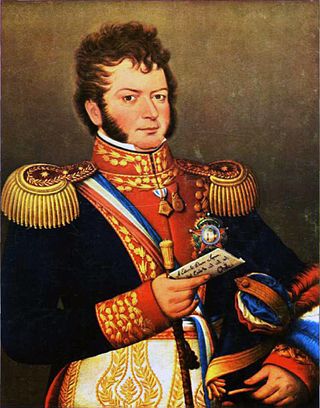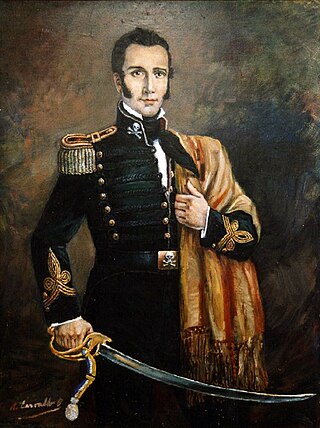This article needs additional citations for verification .(February 2024) |
| |||||
| Decades: | |||||
|---|---|---|---|---|---|
| See also: | |||||
The following lists events that happened during 1821 in Chile .
This article needs additional citations for verification .(February 2024) |
| |||||
| Decades: | |||||
|---|---|---|---|---|---|
| See also: | |||||
The following lists events that happened during 1821 in Chile .

Bernardo O'Higgins Riquelme was a Chilean independence leader who freed Chile from Spanish rule in the Chilean War of Independence. He was a wealthy landowner of Basque-Spanish and Irish ancestry. Although he was the second Supreme Director of Chile (1817–1823), he is considered one of Chile's founding fathers, as he was the first holder of this title to head a fully independent Chilean state.

The Carrera family of Chile became politically influential during the colonial period and played a significant role in the Chilean independence. They remained politically important throughout the 19th century.

José Miguel Carrera Verdugo was a Chilean general, formerly Spanish military, member of the prominent Carrera family, and considered one of the founders of independent Chile. Carrera was the most important leader of the Chilean War of Independence during the period of the Patria Vieja. After the Spanish "Reconquista de Chile" ("Reconquest"), he continued campaigning from exile after defeat. His opposition to the leaders of independent Argentina and Chile, San Martín and O'Higgins respectively, made him live in exile in Montevideo. From Montevideo Carrera traveled to Argentina where he joined the struggle against the unitarians. Carreras' small army was eventually left isolated in the Province of Buenos Aires from the other federalist forces. In this difficult situation Carrera decided to cross to native-controlled lands all the way to Chile to once and for all overthrow Chilean Supreme Director O'Higgins. His passage to Chile, which was his ultimate goal, was opposed by Argentine politicians and he engaged together with indigenous tribes, among them the Ranquel, in a campaign against the southern provinces of Argentina. After the downfall of Carrera's ally, the Republic of Entre Ríos, and several victories against the United Provinces of the Río de la Plata, Carrera's men were finally defeated by numerically superior forces near Mendoza. Carrera was then betrayed by one of his Argentine helpers, leading to his capture and execution in that city.

Manuel Xavier Rodríguez Erdoíza was a Chilean lawyer and guerrilla leader, considered one of the founders of independent Chile. Rodríguez was of Basque descent.

General Francisco de la Lastra y de la Sotta was a Chilean military officer and the first Supreme Director of Chile (1814).

Ignacio Carrera Pinto was a Chilean hero of the War of the Pacific. Carrera and his 77 men of the Fourth Company of Chacabuco are regarded in Chile as great heroes, and are commonly referred to as the "Héroes de la Concepción", after all were killed in the Battle of La Concepción.

Instituto Nacional General José Miguel Carrera, often shortened to Instituto Nacional, is a public middle and high school in downtown Santiago, Chile which teaches 4.400 students between 7th and 12th grade. 170 teachers are employed.

Colonel Luis Florentino Juan Manuel Silvestre de los Dolores de la Carrera y Verdugo was a Chilean military officer who fought in the Chilean War of Independence. Together with his brothers José Miguel and Juan José, they were some of most important leaders of Chilean struggle for independence during the period of the Patria Vieja. The Carrera family is of Basque origin.

Francisca Xaviera Eudoxia Rudecinda Carmen de los Dolores de la Carrera y Verdugo, better known as Javiera Carrera, was a Chilean independence activist. Together with her brothers José Miguel, Juan José and Luis, she was one of the leading figures of the early Chilean struggle for independence during the period known as the Patria Vieja. She is credited with having sewn the first national flag of Chile and is considered to be the "Mother of Chile".

María Mercedes Fontecilla y Fernández de Valdivieso was a First Lady of Chile for less than two months in 1814 through her marriage to José Miguel Carrera.

Héroes is a Chilean TV miniseries produced by Canal 13 in 2007.

Spanish Reconquest or just Reconquest is the name of a period of Chilean history that started in 1814 with the royalist victory at the Battle of Rancagua and ended in 1817 with the patriot victory at the Battle of Chacabuco. During this period, the defenders of the Spanish Empire reestablished their dominion in Chile after said country had separated itself from the Spanish Crown, installed its First National Government Board in 1810—the first institution of self-government in Chile, created its First Congress National in 1811 and subsequently elected its first supreme director, Francisco de la Lastra, in 1814.
Many Basques arrived in Chile in the 16th, 17th, 18th, 19th and early 20th century from their homeland in northern Spain and parts of southwestern France, as conquistadors, soldiers, sailors, merchants, priests and labourers. Due to their traditional hard work and entrepreneurship, many of them rose to the top of the social scale and intermarried into the Chilean elites of Castilian descent, giving birth to the new Basque-Chilean aristocracy in Chile. This union is the basis of the Chilean elite of today. But also, they immensely contributed to the ethnic make up of the bulk of the Chilean population. The Basque settlers also intermarried into the Mestizo and Castizo population of central Chile in the middle of the colonial period to form the large Criollo population that exists in Chile today; Castizos create modern middle and lower classes. Many years after the first waves of settlers, thousands of Basque refugees fleeing Spanish Civil War in 1939 also settled and have many descendants in the country and have even intermarried with Spanish ethnic groups other than Castilians, and other European ethnic groups. An estimated 1.6 million (10%) to 5 million (30%) Chileans have a surname of Basque origin. This figure is to the least as the number of Basque descendence is great and plentiful. Due to Basque migration, Chile has a higher number of people of Basque descent than the Basque Country itself.

Events from the year 1814 in Chile

The president of the Chamber of Deputies of Chile is the highest authority of the Chamber of Deputies of Chile. The office was established in 1811 by the First National Congress of Chile.
The Battle of Les Tres Acequias, fought during the Chilean War of Independence, occurred near San Bernardo on 26 August 1814. The confrontation occurred between the two factions of Carrera and Bernardo O'Higgins, resulting in a defeat for O'Higgins that would in turn lead on to the defeat of the nationalists by the royalist forces at the battle of Rancagua a month later.
The following lists events that happened during 1811 in Chile.
The following lists events that happened during 1812 in Chile.
The following lists events that happened during 1813 in Chile.

Juan José Pedro de la Carrera y Verdugo or Juan José Pedro Carrera was a Chilean soldier and patriot who actively participated in the first phase of the Chilean War of Independence, a stage known as the Patria Vieja. In support for his brother José Miguel Carrera, and together with his younger brother Luis and other Republican officers, he formed one of the main factions within the supporters of Independence: the Carrerino group. He was shot to death in Mendoza together with his brother Luis, at the hands of the city authorities.